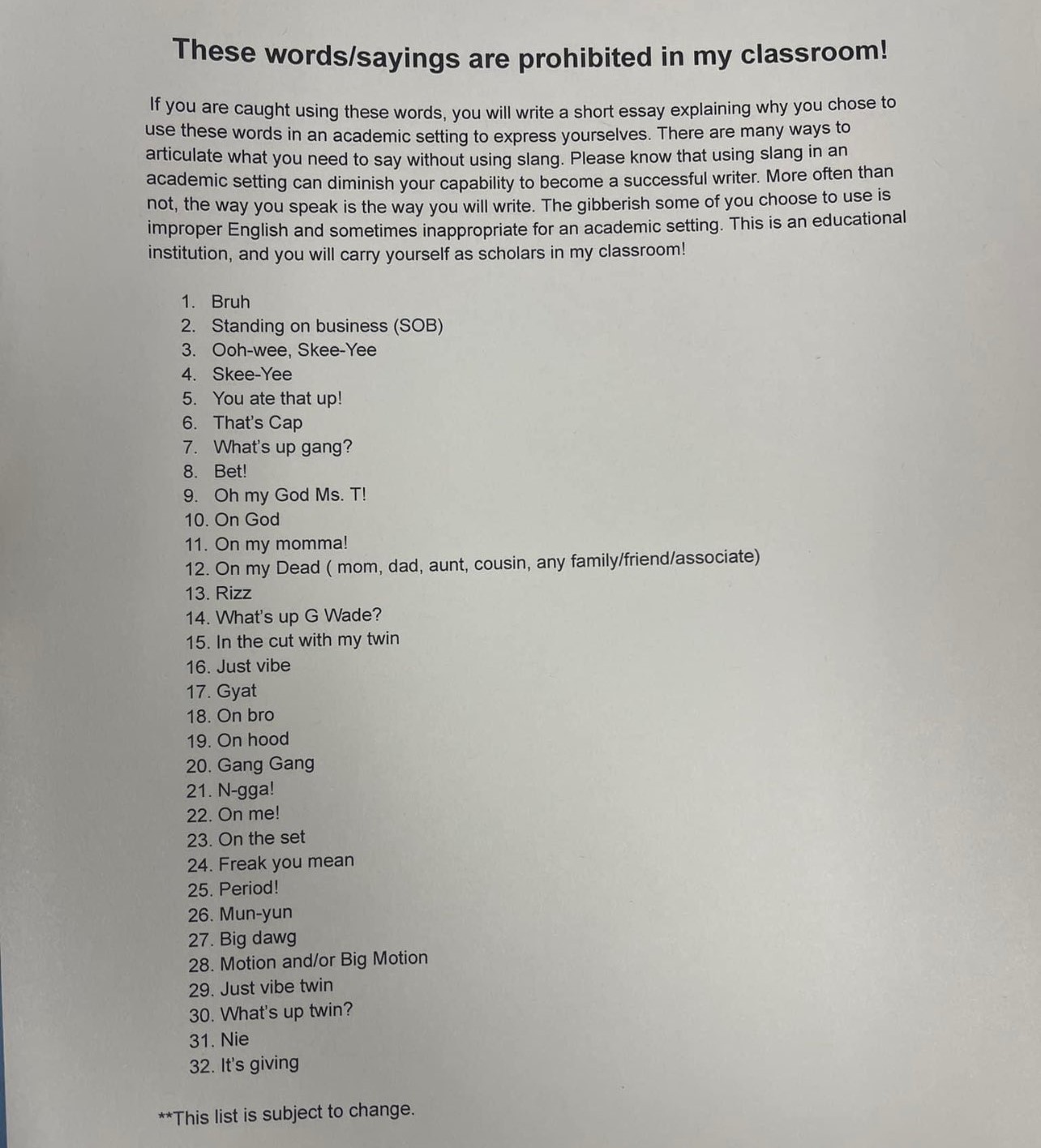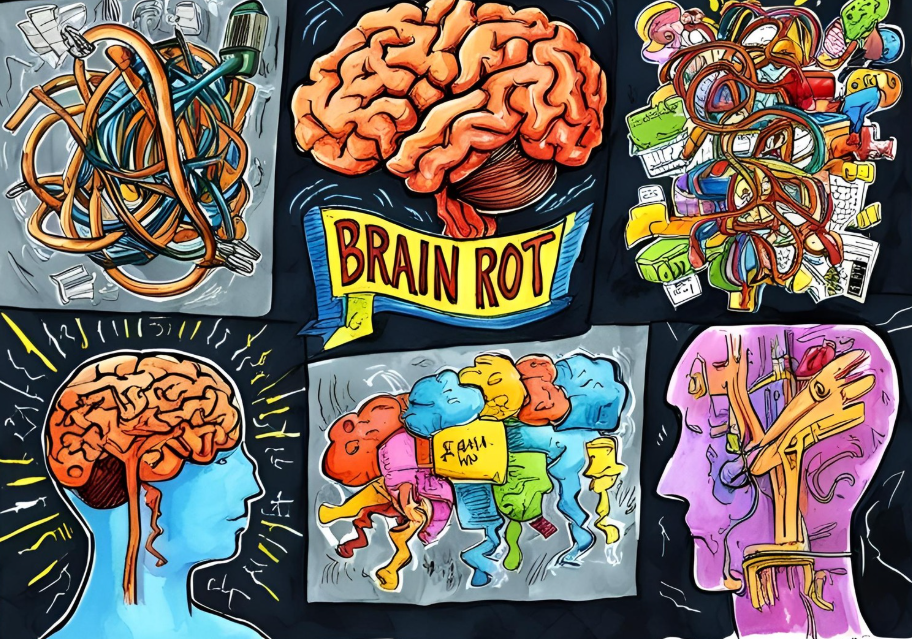“Miss Brisse, do you have rizz?” a student asks. The classroom bursts into quiet laughter. Emily Brisse pauses, blinking. She knows what the word means: charisma, charm, online swagger. While it is not the first time a middle schooler has asked her this, she has never seen online slang take over her classroom quite like this in her 20 years of teaching English.
Phones may be banned in her classroom, but “brain rot” still manages to creep in.
“Mindless scrolling is impacting students’ ability to engage in the class,” Brisse said. “They can be really motivated and really good critical thinkers, but they get distracted much more easily.”
“Brain rot” refers to both the low-quality, trivial content flooding social media and the internet and the negative effects it has on focus and mental engagement. Named Oxford’s Word of the Year in 2024, the term has surged in popularity, driven largely by Generation Alpha, born between 2010 and 2024. The usage of the term has increased by 230% in the past year.

From the bizarre “Skibidi Toilet” videos featuring humanoid toilets to the “Mewing” trend focused on sculpted jawlines, brain rot content now shapes classroom conversations worldwide. The impact is not limited to Brisse’s Minnesota classroom; across cultures, Generation Alpha has embraced the phenomenon with striking enthusiasm.
“My younger brother, who is 8 years old this year, will sometimes make references to TikTok brain rot,” said Iman El Moctar, a journalism sophomore at Northwestern University in Qatar (NU-Q). “It’s interesting because he doesn’t speak English, but all of his references are from popular English language trends like Skibidi toilet.”
El Moctar’s brother has picked up a surprising amount of English from what she calls “nonsense brain rot on TikTok.” The situation is the same in his Arabic-language public school, where classmates echo the same memes and catchphrases, their cultural and linguistic differences blurred by shared digital spaces. When asked where they learned this language, the answer is almost always the same: TikTok, YouTube, or video games like Roblox.
This is not entirely surprising, considering Generation Alpha has never known a world without digital connectivity. Their engagement with online content is nearly constant, with 43% having had a tablet before age six and 58% owning a smartphone before age ten. Platforms like YouTube and TikTok, designed for quick, addictive consumption, shape their cultural landscape.
Sulafa Zidani, an assistant professor and global digital culture scholar at Northwestern University, sees a clear link between the rise of brain rot and the way these platforms prioritize engagement.
“Popular online platforms right now promote content that is short and quick to keep users scrolling and consuming content on their platform, which, in turn, increases the platform’s profits,” Zidani said. “Brain rot fits perfectly for this economic structure because it does not ask users to slow down or engage in a deeper way with content.”
She also noted that, as the world continues to face difficult issues, such as “COVID-19, the climate crisis, genocide, the rise of fascism,” brain rot has become particularly appealing to Generation Alpha because it provides an escape from these realities. “Some brain rot trends resonate globally and generate local remakes,” she added, citing an Arabic version of the “Oo Ee Aa” meme where the cat sounds are compared to Tarab, the transcendent enjoyment of music.
But the seemingly harmless nature of brain rot trends can mask their real-world consequences.
“I’m noticing that my boys, my male students, are much more body conscious than they ever were before,” Brisse said. She points to the brain rot “Mewing” trend, which involves positioning the tongue against the roof of the mouth in an attempt to achieve a sharper jawline, as the cause. According to Brisse, Mewing has fostered pressure around appearance, personal achievements, and self-presentation. “I have a young son, and so I’m also just thinking about what that’s like for him,” she added.
Beyond aesthetics, Brisse has noticed rising levels of stress, anxiety, and depression in her students. She attributes it, in part, to their relentless digital engagement. “They’re over-plugged into their online lives,” she said.
As brain rot becomes embedded in Generation Alpha’s life, its influence is also reshaping attention spans, changing how they approach education altogether. Some students are turning to tools that adapt academic content to the fast-paced, hyper-stimulating format they are used to. One such tool, Memenome, uses Artificial Intelligence (AI) to translate dense academic texts into short-form, brain-rot-style content. It has already amassed more than 500,000 users.
“With exposure to a sea of content online, younger generations have adapted to develop shorter attention spans to pick or click videos that are the most useful to them,” said Pirooz Romouzi, Memenome’s chief marketing officer. “This same pattern carries through with learning.”
Romouzi and Jackie Ni, the CEO of Memenome, saw this firsthand while teaching — Romouzi in a remote village in Bali and Ni at a U.S. summer camp. In both cases, they realized that to keep students engaged, lessons had to be constantly entertaining and interactive. Their solution is to fight brain rot with brain rot.
“If students are presented with content that does not capture their attention within the first few seconds inside a classroom, they are likely going to disengage and lose focus,” said Romouzi. “We believe that simplifying complex topics [with brain rot] makes learning more accessible by bringing students to the table.”
With their platform Memenome, a biology textbook, for instance, can be converted into a Minecraft-style gameplay video, where an AI-generated voice narrates: “Mitochondria be the ultimate MVPs of cell life, forever grinding that oxidation game like they on Twitch 24/7.”
While some educators see this as a necessary adaptation, others worry that leaning into brain rot reinforces the very habits that make deep learning harder.
“We don’t want to create a situation where we take things that are really hard and make it just super, super easy all the time,” said Brisse. “There’s a role for effortful thinking.”
As digital culture shapes a new generation’s language, attention, and self-image, the effects of brain rot are no longer just a question of screen time — they are a question of identity. And in a world moving faster than ever, slowing down to think might be the most radical act of all.








